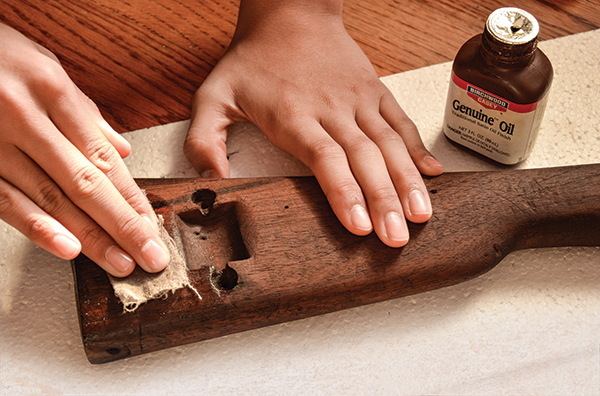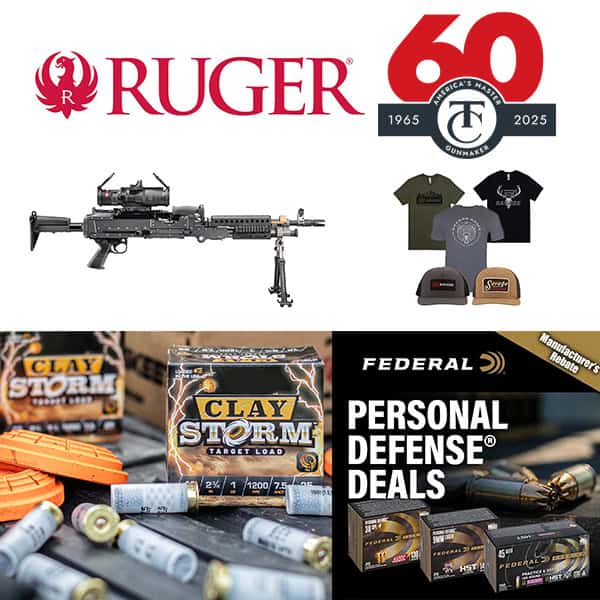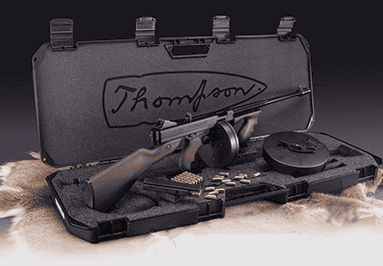Gunsmith or Armorer?
Different Skill Sets Provide Different Services To Diverse Clientele
Gun store owners need a person who can work on guns, but they should be careful how they refer to that person. Many stores have a knowledgeable person on staff they erroneously call an armorer. Others compound the error by referring to the same person as a gunsmith. Odds are the gun counter “expert” is neither. Such a casual mistake can cost a retailer credibility and income.
“Armorer” and “gunsmith” have specific definitions. An uncertified associate who can install a scope or a recoil pad is merely a layman able to perform rudimentary tasks. An armorer has a much more advanced skill set. A gunsmith has the most advanced training.
By definition, an armorer is a factory-trained expert in firearm diagnostics and replacing defective parts to the manufacturer’s specifications. An armorer usually specializes in a certain type of firearm. A gunsmith is an expert in the design, function and repair of any firearm. A gunsmith can do everything an armorer can do and more, including building a firearm from scratch.
Know Your Desired Skill Set
Kevin Poley, owner of Crossfire Gunsmith and Firearms in Lexington, S.C., is a master gunsmith. He contends a gunsmith has the knowledge and equipment to make parts if he can’t find them for sale. He can blue metal, and he can fit and embellish wood.
Which skill set do you need on staff? It depends on the level of service you want to provide to customers and what reputation you want to cultivate in a competitive retail market.
Because of the booming firearms market, many people of all ages are entering the gunsmithing business, and many find an ideal portal into this lucrative profession with the online programs offered by the American Gunsmithing Institute (AGI).
Gene Kelly, founder and president of the American Gunsmithing Institute in Napa, Calif., has trained thousands of working gunsmiths through AGI’s interactive online program that teaches a student to analyze any firearm’s operating system, diagnose its failures and malfunctions and perform the repairs necessary to make it function safely.
AGI’s lowest level of instruction teaches the design and function of all firearms. Another level offers a machine shop course, including welding, and various customizing courses.
“You’re getting training in two additional trades that could make you money in a pinch,” Kelly noted.
AGI’s Master Level course includes instruction on tungsten inert gas (TIG) welding, certifications on building custom 1911 pistols, custom GLOCKs, custom AR-15 rifles and building custom hunting rifles on Remington Model 700 and Mauser actions. Other courses teach bluing, metalworking and even business success training.
Because of its “building block” structure and remote learning environment, Kelly said an AGI education enables a student to begin earning money in as little as 90 days.
“It takes 90 days to get an FFL,” Kelly informed. “You can start gunsmithing almost immediately. After you’ve done the first 20 hours of training, you’re starting to understand the things you need to know so you can do assembly, disassembly, cleaning, how to mount scopes and how to mount recoil pads. Those are the moneymakers.”
A separate division of AGI has 68 armorers’ courses for myriad gun families. The limitation is that each course only certifies an armorer to work on a particular type of firearm.
“It offers an education for somebody who wants to work in a gun shop,” Kelly explained. “In every armorer’s course, we use a cutaway gun to teach design and function on that one particular gun, from old single-action Colts to modern GLOCKs and SIGs.”
Gunsmith: Necessity Or Luxury?
A person with gunsmith training, experience and expertise is an expensive asset that might make many gun shop owners balk. To Kelly, a gunsmith is a requisite.
“Absolutely, for a number of reasons,” he confirmed. “A gunsmith can obviously be a profit center. Secondarily, for any entrepreneurially thinking dealer, a gunsmith gives you two bites of the apple. You get the first bite when they bring the gun in, and you get the second bite when they come back to pick it up. That’s two opportunities for them to be in your shop where you can suggest upgrades and accessories and interest them in buying some additional firearms. It allows you to survey the full background of a customer’s interest.”
Your location might determine the necessity of employing at least one full-time gunsmith. Mandi Sano, president of The Gun Doctor in Roselle, Ill., is a dominant resource in the most gun-hostile region of a gun-hostile state. It’s a tough neighborhood for a firearms business, but Sano said her business is flourishing. Her gunsmithing services are widely known, and they’re a major part of her success.
“There’s not a lot of gunsmiths in northern Illinois,” she said. “A lot of stores around us, up to 50, 70 miles away, send gunsmith inquiries to us. We tend to get the trainwrecks, you know, ‘Dad’s 100-year-old shotgun that needs extensive work and refinishing,’ that kind of thing.”
The Gun Doctor’s reputation is well-established. Sano’s father, a native of Japan, immigrated to the United States largely because he could not satisfy his ardor for firearms in his home country. He was certified at a New Mexico gunsmithing school in 1953 and gained proficiency before opening his own business in Illinois in 1972.
“We’re a retail shop first and a gunsmith second,” Sano noted. “It’s worked out pretty well for us. We’ve had our ups and downs, but we’ve been fortunate and blessed.”
So, Gunsmith Or Armorer?
The answer to whether you need an armorer or a gunsmith on staff again depends on your business model. The expert and advanced enthusiast nature of Kevin Poley’s business leaves little need for an armorer.
“You’re better off with a gunsmith,” he asserted. “If parts need to be made, a gunsmith is more capable of doing that. A lot of people, when they bring in a gun, expect you’re able to fix it immediately. Sometimes this isn’t the case. Sometimes it takes time for us to get parts. If we can’t find the part, we have to manufacture the part. A lot of people want to drop their gun off on Monday and they want it back on Friday. There are times when it’s not going to happen.”
How does a store owner afford such a highly skilled employee? The answer to this question is complicated. Some retailers emphasize sales first and service second. Poley is inverse: Selling guns is secondary to his gunsmithing business.
“Gunsmithing is a lot more profitable than owning a gun store and selling guns,” he said. “Your margin on selling guns is so small. It’s so competitive. Some of the big-box stores, you just can’t compete with them. If I’m selling a .22 rifle for $200, they’re selling it for $125. They have the money to do that, and they like to squash the other people.”
The diverse nature of The Gun Doctor’s clientele requires both skill sets. Staffing both skill sets maximizes efficiency.
“I have two gunsmiths and one armorer on staff,” Sano shared. “It’s beneficial for business if you’re in a position to have both. If a customer wants his dovetail sights changed, that’s where an armorer is critical. He can do it in a timely manner, and I don’t have to tell a customer there’s 1,200 guns in front of you and a 12-week turnaround time.”
A Fine Line
Like Sano, Jim Jones, owner of J&L Gunsmithing in Chesapeake, Va., is also the de facto gunsmith for retailers in the Tidewater area who don’t have their own “smith” on staff. The problem some stores have, according to Jones, is they have armorers who are not capable of doing work that ultimately requires a gunsmith.
“I won’t give any names, but there’s more than one store in this area that has armorers, and they’re doing okay with those gentlemen,” he said. “They kind of state they have a gunsmith, but when someone brings in something out of their ability level, they bring it to me. I turn it around quickly, and they’re kind of the hero. I don’t know how informed the customer is it was done somewhere else.”
Misrepresenting your staff’s abilities isn’t a problem until it is, and then a problem can significantly damage your business’s reputation.
“As long as they have access to somebody who can take care of them if they do get in over their heads, then it’s not a problem, but it’s a fine line,” Jones said.
“There are stores in our vicinity that have armorers, but they send their true gunsmithing work to us,” Sano stated, echoing Jones. “There’s a corporate-owned store that advertises gunsmithing, but they can’t work on a 1952 Browning Auto-5, so they send it to us.”
Gene Kelly agrees. He added that misrepresenting a staffer’s abilities can also create legal issues.
“Some people call the AR-15 somewhat of a LEGO you can bolt things onto, but many people can’t make the gun work properly because they truly don’t understand its subsystems,” he noted. “Even armorers can have problems with the platform if they don’t understand what they’re doing. If you shorten the barrel, for example, you change the whole gas curve.”
He continued, “And now they’re an armorer, but if a gun comes in and they do not know the systems, they can start costing you money in a hurry, and they can create liability.”
If your business model requires a gunsmith or an armorer (or both), you must balance the volume of work available with their experience. Then, as their reputations grow, you might be challenged to retain them.






